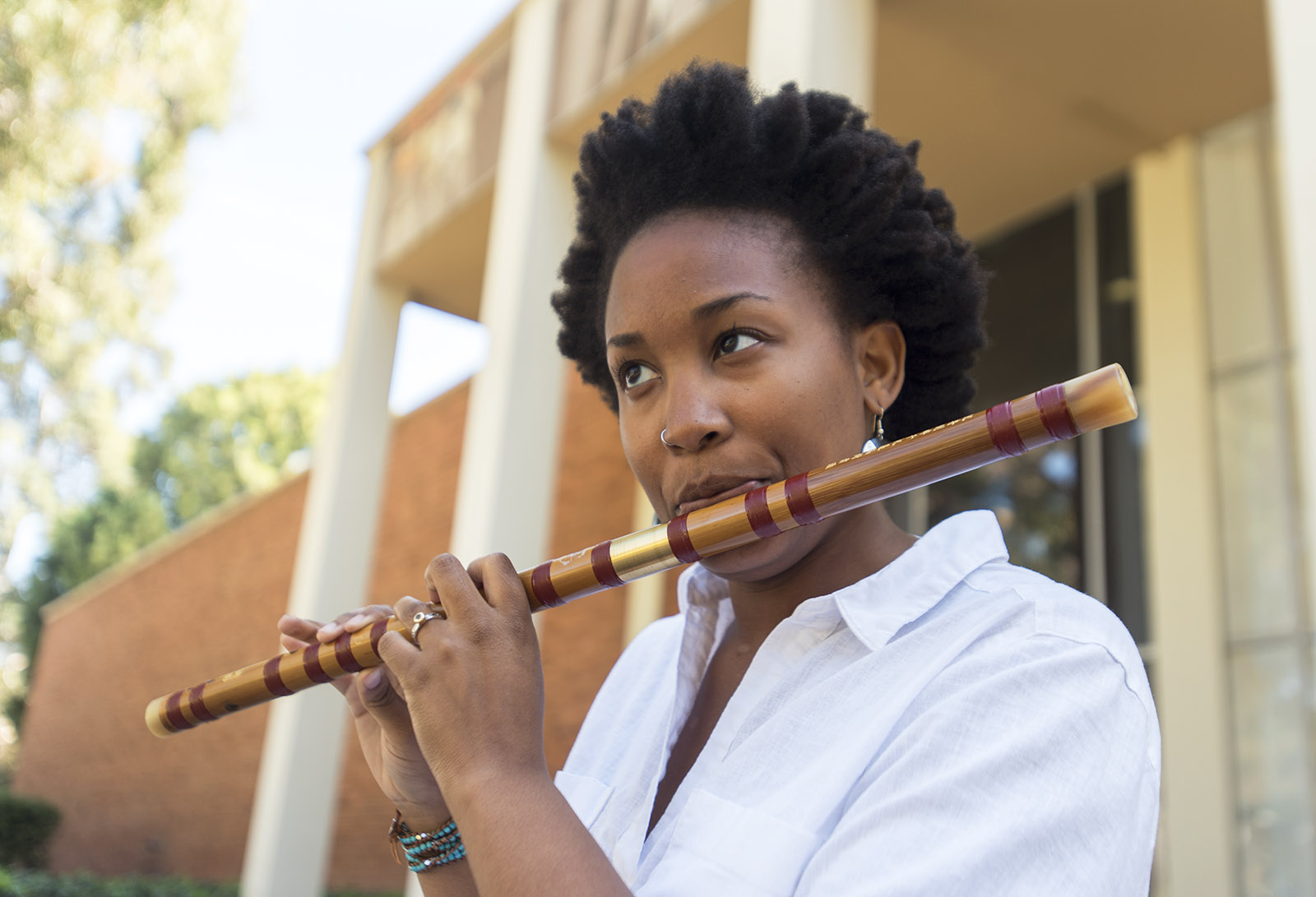Sounds of Schoenberg: The Chinese dizi

UCLA graduate student of ethnomusicology Rose Boomsma, who is also a classical Western flutist, has been learning how to play the Chinese dizi for the past three years. (Anisha Joshi/Daily bruin)
By Alexa Gonzales
March 4, 2016 12:00 a.m.
Each week, Daily Bruin A&E will explore the instruments of the World Musical Instrument Collection and their performers that all contribute to the musical landscape of the UCLA Herb Alpert School of Music. This week, we highlight the Chinese “dizi,” a bamboo flute.
Rose Boomsma sat in a music room in Schoenberg Hall with her nervous hands wrapped around her dizi, a Chinese bamboo flute. She stumbled as she tried to accompany a Chinese opera singer’s complicated melodies in a workshop led by a professional Chinese opera performer. She had only begun to play the dizi a year prior.
“I felt lost half the time,” Boomsma said. “It was a little stressful, but it was kind of fun.”
Boomsma, a graduate student in ethnomusicology, has spent the past three years learning how to play the dizi as part of the Chinese ensemble and accompanist to the main singer in “kunqu,” the Chinese opera, at UCLA. Her work with the dizi is a departure from her extensive training as a classical Western flutist, but she said she has grown as a musician through the unexpected switch.
Boomsma had heard from other graduate students that the dizi would be easy to learn with prior flute experience, but she quickly discovered that her Western flute skills would be of less help than she expected. Her training in Chinese ensemble rehearsals consisted of little one-on-one instruction, leaving her to figure out how to play most of the music on her own.
“It was difficult, but you just kind of have to be able to jump in and follow along,” Boomsma said.
Boomsma first had trouble getting accustomed to reading Chinese musical notation, a system that uses numbers and lines instead of notes on a staff. When she played octaves, she would miss the correct timing, since octaves are indicated by dots rather than the higher or lower placement of certain notes in the music.
Boomsma had to let go of her strict sight-reading habit, especially when learning kunqu music, a style that relies heavily on improvisation and musical ornaments.
“When I was playing classical flute, if I learned all the notes on the page with a metronome I was playing it correctly,” Boomsma said. “But if you do that with this (kunqu), you’re missing a lot of it.”
She began to pay more attention to ornaments, listening closely to the many extra notes that ethnomusicology adjunct associate professor Chi Li would sing in rehearsal and writing them down. Soon, her kunqu sheet music was covered with several rehearsals’ worth of tiny, penciled-in scribbles of added musical embellishments.
When playing the dizi, Boomsma slides her fingers over the open holes of the bamboo body, allowing her to play more notes than when pressing down buttons on the Western flute. Boomsma said she is drawn to these varying tones because they create more freedom for expression.
“If you’ve only been playing Western music, you don’t use those tones ever. If you do people will be like you’re flat, you’re sharp, you’re playing it wrong,” Boomsma said. “But with this, it’s part of the ornaments, the aesthetic.”
In her first year of playing the dizi, Boomsma felt she played sloppily and struggled to keep up with the rest of her ensemble. Now, she learns her kunqu parts much faster, while the main singer follows along with her.
“It’s sort of, like, detached from me actually thinking about what I’m playing now,” Boomsma said. “I’ve gotten to a certain comfort level, a muscle memory.”


